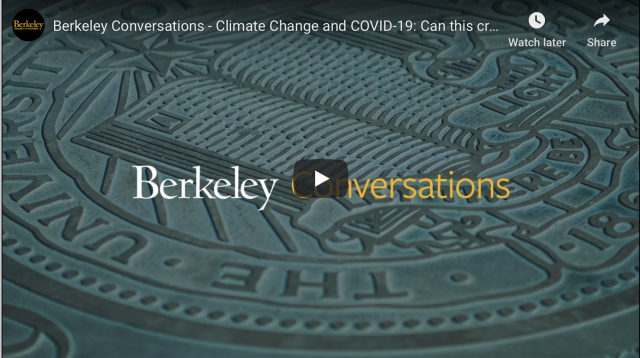NEWS Berkeley Conversations: Climate Change and Covid-19, can the crisis shift the paradigm?
April 27, 2020. To watch the webinar, click here.
A panel of UC Berkeley experts discussed Monday what effect COVID-19 is having on the environment. (UC Berkeley video)
Ever so slowly, communities around the globe are cautiously easing shelter-in-place orders, and people are heading back to work — bringing with them damaging behaviors that hurt the environment and impact climate change, such as increased reliance on single-use plastic grocery bags.
But it doesn’t have to be that way, say four UC Berkeley environmental and energy experts. Instead, they say, the current COVID-19 pandemic offers lessons in how shared global solutions can help beat back the continued threat of climate change.
“We can restart the economy and put people back to work, and we have to do so in a way that we’re taking advantage of where renewable energy is today — then there’s a really positive opportunity,” said Dan Kammen, professor and chair of the Energy Resources Group and professor of public policy and nuclear engineering. “We have to put people back to work in a way that’s equitable and green.”
Disposable plastic bags have made a comeback as people have grown leery of being too close to other people and their possessions. In a number of cities and states, including San Francisco, new bans on plastic bags have been delayed or existing bans have been temporarily halted and customers ordered not to bring into shops their own bags, mugs or reusable items from home.
Kammen, along with colleagues David Ackerly, dean of the Rausser College of Natural Resources, Kate O’Neill, professor of environmental science, policy and management, and Valeri Vasquez, a Ph.D. candidate in the Energy and Resources Group, were part of a Berkeley Conversations panel that examined on Monday how the pandemic has caused seismic shifts in how we produce and consume goods and could also open a path to a more sustainable future.
“Right before the outbreak, we were actually starting to feel like we could make a real difference in terms of getting rid of single-use plastics and solving a lot of the issues with global waste streams,” O’Neill said. “But for any of us who’ve been in the Berkeley Bowl parking lot recently, one of the first things we might have noticed is a lot more litter. Plastic bags, rubber gloves, masks. This is something we’re going to have to push back on and really question. The main problem coming up is going to be reinstating zero waste policies once (the pandemic) is over.”
Vasquez underscored how the COVID-19 pandemic is revealing deep societal inequities and also demonstrating the interconnectedness of health, climate and sustainability issues.
“The public health and climate debates are really inextricably linked,” she said. “In our highly connected world, a disease that originated 3,000 or 6,000 miles away can be at our doorsteps in a day or less. So, the way that we mobilize against COVID-19 needs to be reflected in the way that we mobilize against that other big global affliction called climate change.”
Berkeley Conversations: COVID-19, are a series of live, online events featuring faculty experts from across the UC Berkeley campus who are sharing what they know, and what they are learning, about the pandemic. All conversations are recorded and available for viewing at any time on the Berkeley Conversations website.

You must be logged in to post a comment.